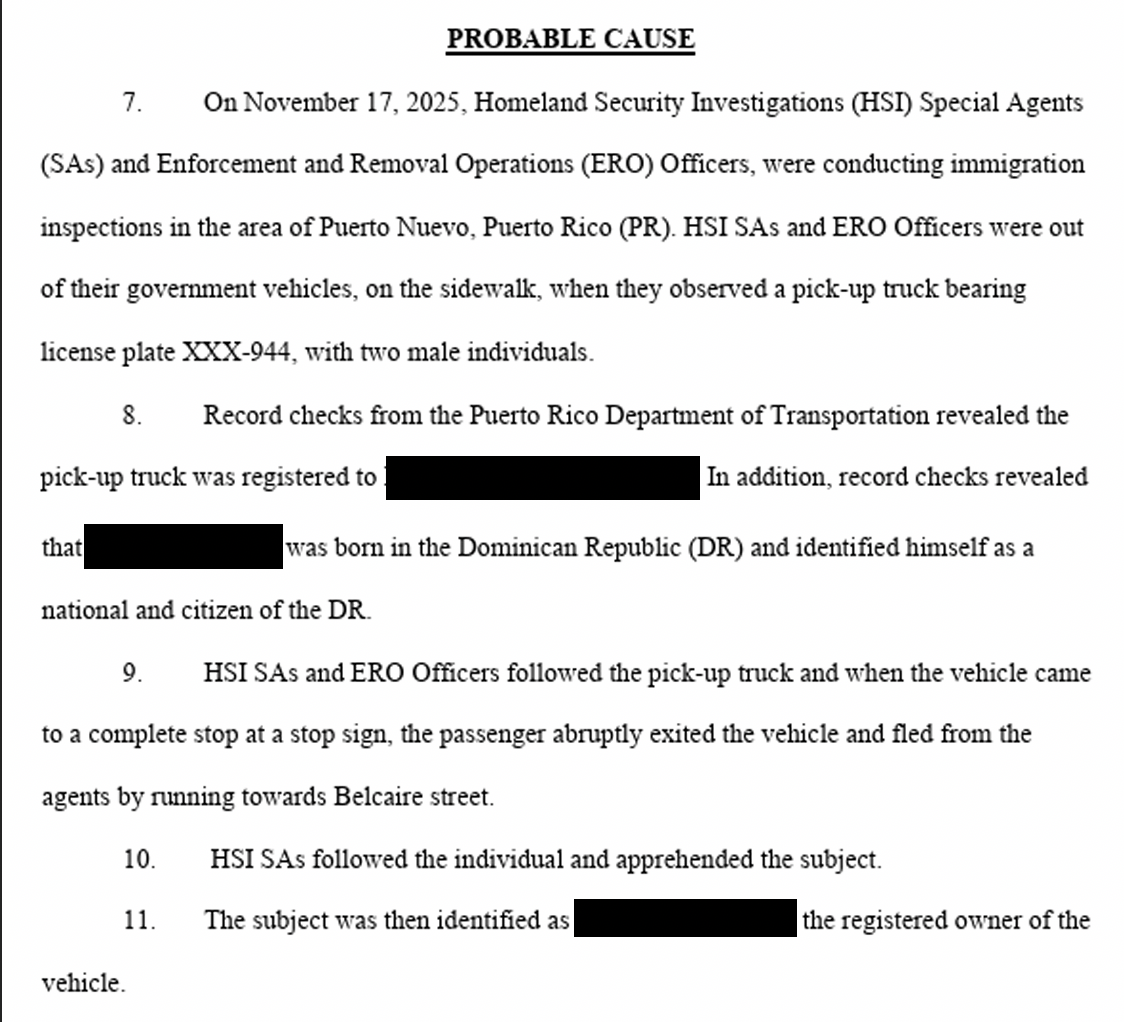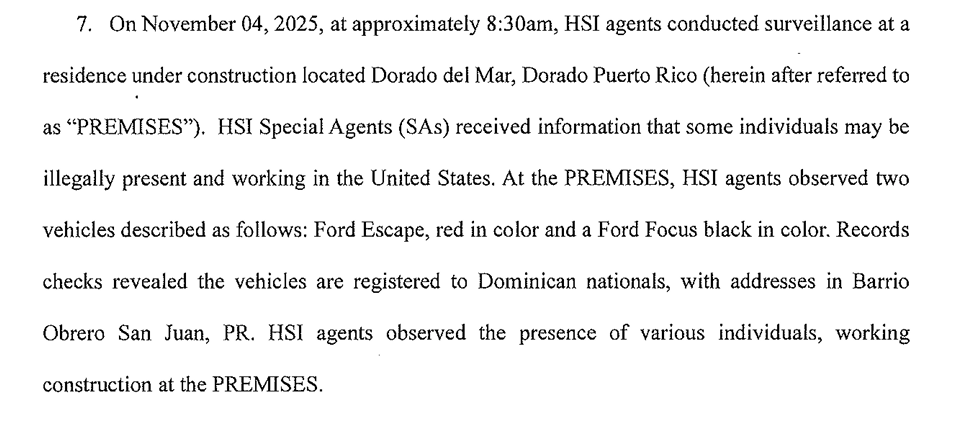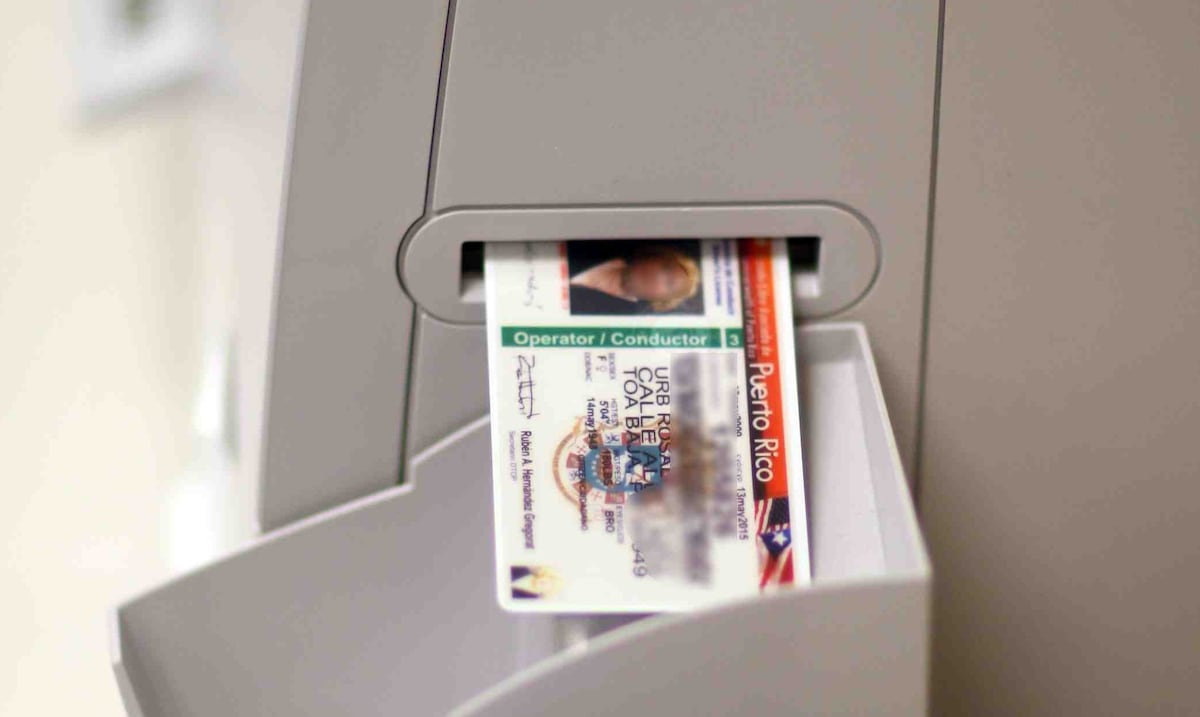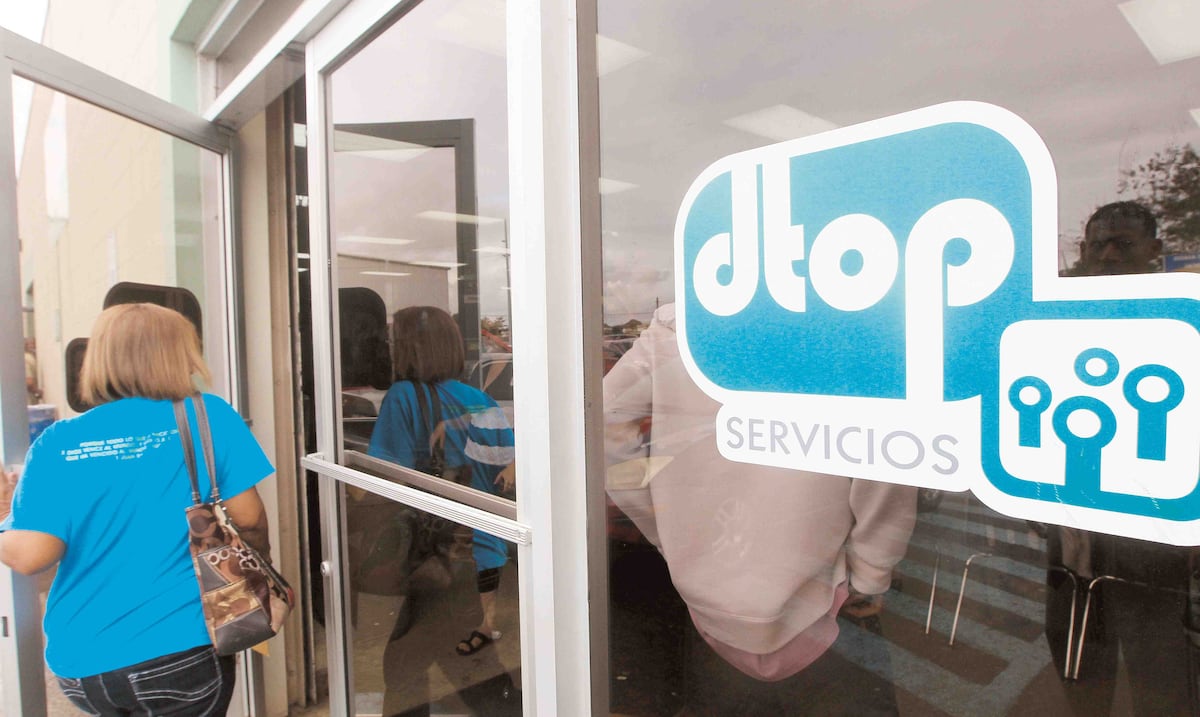SAN JUAN — U.S. Immigration and Customs Enforcement (ICE) has access to a database containing Puerto Rican vehicle registration data, including license plates and owner information, according to federal court records reviewed by The Latino Newsletter.
Queries to this database have preceded a federal immigration agency arrest of an immigrant at least seven times, per the records.
Vehicle registration data is particularly important to federal immigration authorities because it allows them to monitor vehicles around them and the people who own or drive them. Immigration officers can easily identify who is likely to be in a vehicle by searching the license plate or tracking a vehicle through automated license plate readers. When combined with access to records that identify a person’s nationality, this data can be a powerful tool for immigration authorities as they continue their deportation campaign.
This is what happened to a Dominican migrant who was detained in the Puerto Nuevo neighborhood of San Juan.
According to court documents, ICE agents standing on a sidewalk observed a pickup truck with two men inside and conducted “record checks from the Puerto Rico Department of Transportation,” which revealed the owner. A search using the owner’s name showed they “identified themselves as a national and citizen” of the Dominican Republic. The agents followed the truck and arrested the owner of the vehicle, who was riding in the passenger seat, after the man tried to flee.

Excerpt from a federal court record. (Source: PACER)
The Latino Newsletter has redacted the names of the detained individuals for their safety. It is also not publicly posting the court records because they contain personal identifying information.
A second court document shows that ICE’s record checks allow them to see a vehicle’s owner and address. A record check using a person’s name gave ICE the vehicle’s make, model, color, and license plate, another document shows.

Excerpt from a federal court record. (Source: PACER)
All of the men described in the court documents have been charged or indicted with entering the U.S. after being previously removed. Three of the men had been previously convicted on gun or drug charges, according to the federal complaints. One had previously been charged with using a fake name. Another had no criminal history.
Because there is no central federal database of vehicle registrations, the corresponding local agency responsible for it often shares this data with immigration authorities. Puerto Rico’s Department of Transportation and Public Works (DTOP, in Spanish) shared data about immigrants with provisional licenses with ICE after the federal agency sent them an administrative subpoena. It was not previously publicly known that ICE also had access to vehicle registration data.
DTOP declined to comment, referring questions to the Puerto Rico Department of Justice. The PR DOJ acknowledged The Latino Newsletter’s request for comment but did not respond by press time.
It is unclear whether ICE has access only to immigrants' vehicle registration data or to all Puerto Rican vehicle and driver data. However, on one occasion, vehicle records checks at a residence ICE was surveilling returned the identity of a female resident who was not detained, per the court records.

Excerpt from a federal court record. (Source: PACER)
“The Legal Division of the Department of Transportation and Public Works (DTOP) responded to a request from our agency (administrative subpoena), duly issued by a competent authority, as required by due process of law. This information is being analyzed by our Intelligence Group with rigorous and confidential handling of the data in accordance with current legal regulations,” Yariel Ramos, the interim director of Homeland Security Investigations (HSI) San Juan, wrote in a written statement. HSI is a subagency within ICE.
When asked for clarification on whether DTOP shared vehicle registration data with ICE as part of the subpoena that included information about immigrants with provisional licenses, they did not respond by the deadline.
The contents of the subpoena that led to ICE gaining access to immigrants with provisional licenses have not been made public. The ACLU of Puerto Rico sued DTOP for failing to respond to a records request regarding the subpoena. Although a judge said the state agency should hand the information over, DTOP recently appealed the decision.
One federal court record reviewed by The Latino Newsletter shows that ICE used Puerto Rico license and learner’s permit data obtained from DTOP to confirm that the person they detained was a national and citizen of the Dominican Republic.

Excerpt from a federal court record. (Source: PACER)
“If we now know that ICE and HSI can access Puerto Rico license plate data, it means a door has been opened,” David Cordero Mercado, communications director for the ACLU of Puerto Rico, wrote in a written statement.
He explained that they demand agencies conduct an audit of all data exchange channels, publish what data is shared, and then cease any flow of data that facilitates mass immigration raids or deportations beyond the strict requirements of the law. He also said the Puerto Rico government should adopt written policies prohibiting the use of transit and license data for migratory fishing expeditions.
Recently, Democratic lawmakers revealed that some states were inadvertently sharing their drivers’ data with ICE through a little-known data-sharing nonprofit. The organization, called Nlets, allows about 18,000 federal, state, local, tribal, and territorial police organizations throughout the United States and Canada access to drivers’ data. ICE and HSI have made nearly 900,000 queries in the year prior to October 1, according to the letter.
The PR DOJ’s criminal justice information system communicates with Nlets, according to the agency’s website. The system, called SIJC-PR, includes data from agencies such as DTOP, the Department of the Family, the Puerto Rico Police, and others, according to the website.
When asked follow-up questions about whether they have access to Puerto Rican drivers and vehicle registration data through Nlets, ICE/HSI did not respond by press time.
“It is essential that the government of Puerto Rico establish protocols to address this type of information request from ICE/HSI or any federal agency, including appropriate legal counseling,” Cordero Mercado wrote.
He added that state agencies are not obligated to respond to administrative subpoenas unless there is a signed judicial order. Systems like Nlets, he explained, allow government agencies to choose which information is shared, what types of information can be consulted, and which specific agencies have access to it.
“What Puerto Rico needs is not technology, it’s political will to protect our people,” he said.
Nlets did not immediately respond to a request for comment.
About the Author
Carlos Berríos Polanco is a journalist from Puerto Rico who covers climate, conflict, and their intersection. He is also the Deputy Editor of The Latino Newsletter’s San Juan bureau.
We want to keep The Latino Newsletter accessible without paywalls. To help, you can donate here. Any amount (one-time or monthly) will keep us going.
And now a word from our sponsor
The daily health habit you’ll actually stick with…
This time of year, it’s SO hard to stay in control of your health.
Holiday travel (and meals!), big family gatherings, dark and cold days, it’s easy to skip that workout, sleep in later than you should, or have just one more cookie.
That’s why you need a daily health habit that’s easy to stick with.
Meet AG1: With just one quick scoop every morning, you’ll get over 75 ingredients that help support your immune health, gut health, energy, and close nutrient gaps in your diet.
Right now is the best time to get started - with every new subscription, they are giving away $126 in free gifts for the holidays.
Give AG1 a try today and take control of your health this holiday season.
What We’re Reading
Turn Off the Hate: From Julio Ricardo Varela at Pressing Issues, a social justice campaign from Mijente called “Apaga el Odio” demands Univision and Telemundo stop airing Department of Homeland Security “self-deportation” ads.
The Human Cost of El Salvador’s Gang Crackdown: From New Lines Magazine, former inmates arrested under Nayib Bukele’s yearslong state of exception recount the horrors they endured. Meanwhile, family members of current detainees demand answers about their whereabouts.
How Mamdani Won Latinos: From NACLA, a deep dive into how Mayor-elect Zohran Mamdani won the Latino vote in New York City, which has historically been hard to get for progressive candidates.
Julio Ricardo Varela edited and published this edition of The Latino Newsletter. Carlos Berríos Polanco edited the What We’re Reading section.
Consider donating to The Latino Newsletter. Any contribution, no matter how small, helps keep this newsletter free and accessible to all. ¡Gracias mil!









